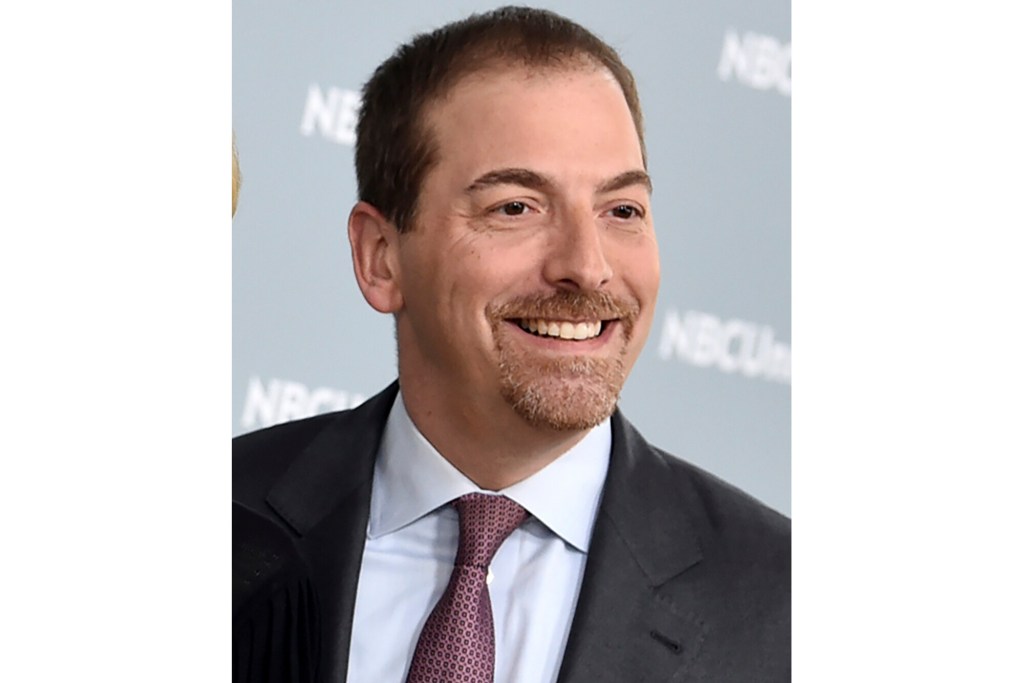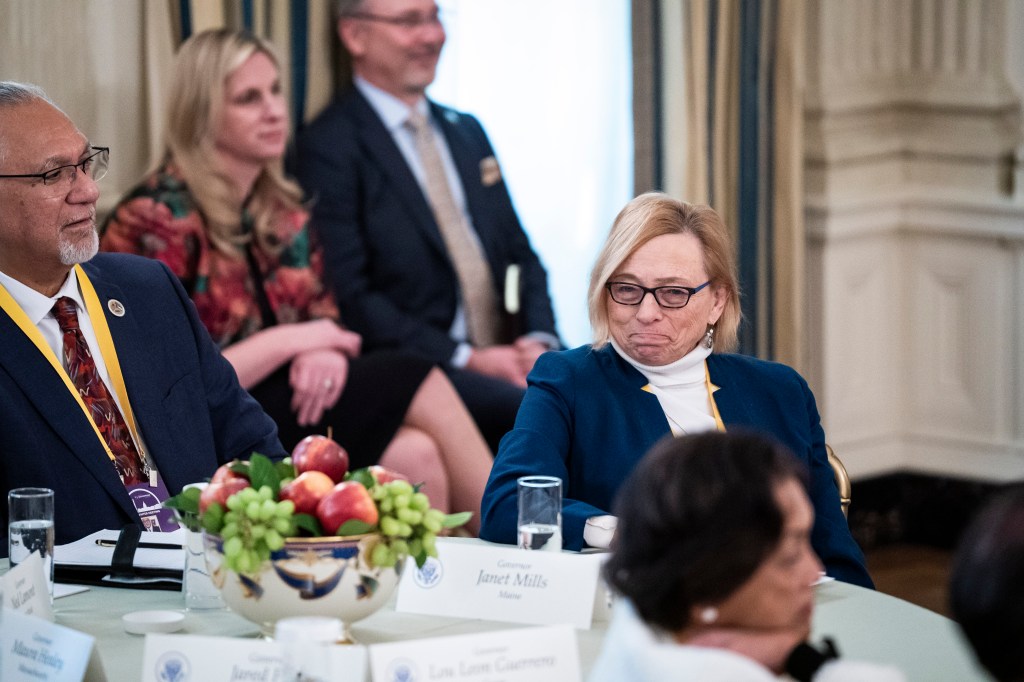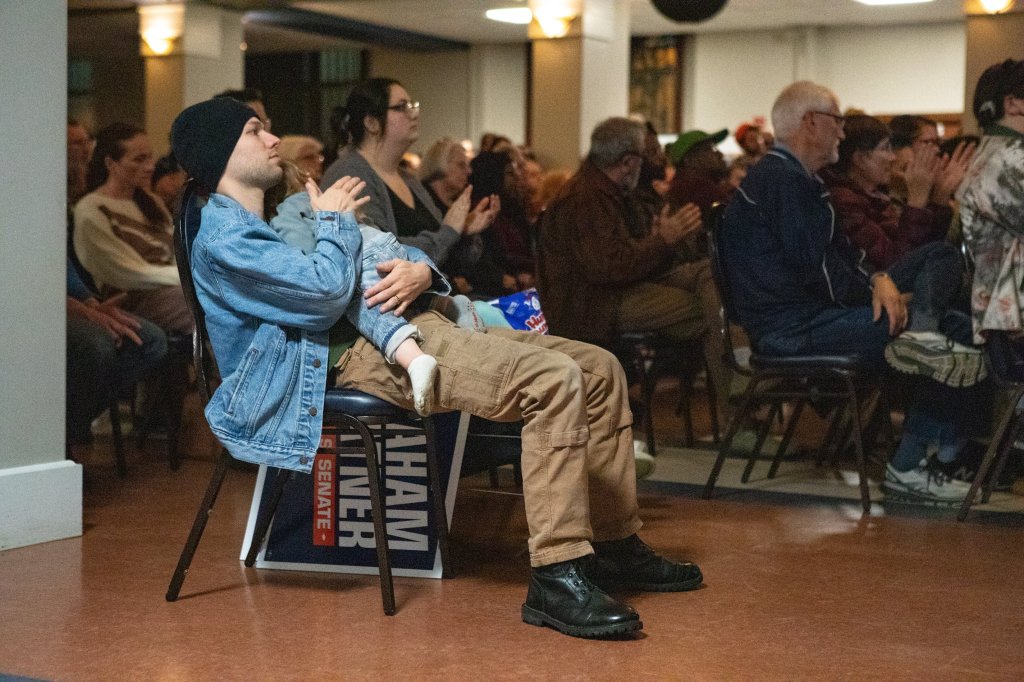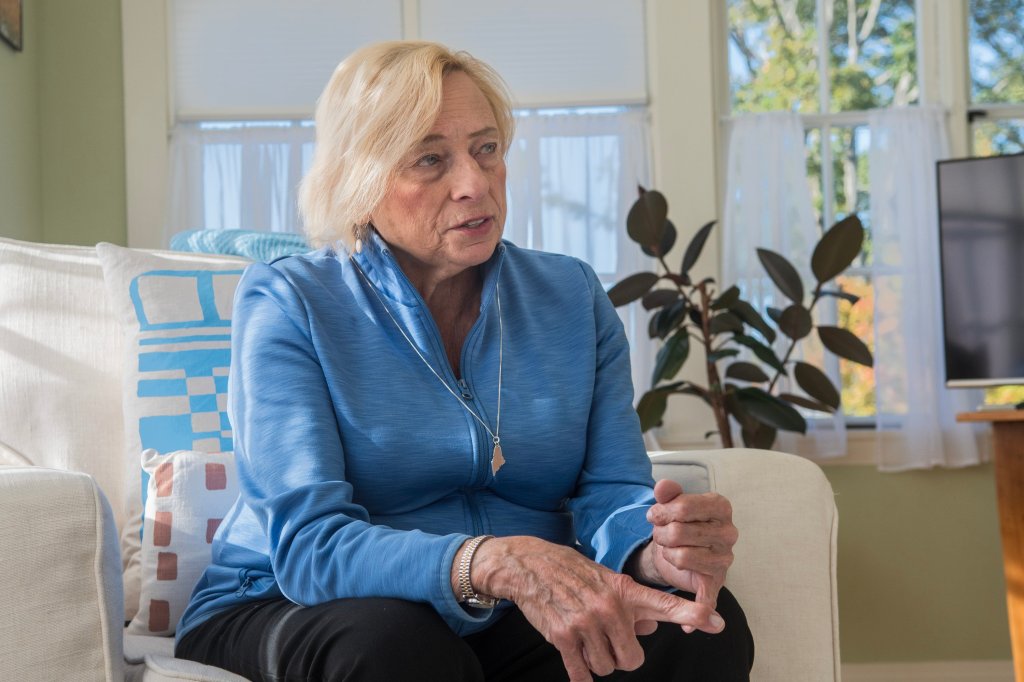The Democratic primary for Maine’s U.S. Senate seat currently held by Susan Collins is emblematic of the national debate over the party’s future.
Should it stick with more experienced — and older — candidates, or pass the torch to a younger generation, including those with no elected experience?
The Democrats’ identity crisis came to a head in 2024, when President Joe Biden sought reelection at the age of 81, despite concerns about his age and an earlier pledge to be “a bridge” to a new generation. He dropped out after a disastrous debate performance, and Donald Trump returned to the White House at the age of 78.
In Maine, Democrats believe Collins has never been more vulnerable, but they appear divided about who they want to challenge the five-term incumbent Republican next fall.
Is it Graham Platner, an untested 41-year-old oyster farmer and military veteran from Sullivan who is drawing hundreds of people to rallies across the state but whose campaign has been tested in recent days by revelations that he made a series of offensive social media posts and comments?
Or Janet Mills, a 77-year-old governor with decades of experience who has twice won statewide elections?
Or maybe one of the lesser-known candidates, like Jordan Wood.
Laura Boyett, a 70-year-old retiree who traveled from Augusta to Lewiston last week to attend a Platner rally, said she was “on the fence” about who to support.
“You’ve got experience versus the energy,” she said. “And there is a big age difference between them, too. Janet is tough. She can stand her ground, and she has with Trump before. So I know she can push back … At the same time, sometimes fresh eyes make a huge difference.”
Chuck Todd, host of the Chuck ToddCast and former moderator for NBC’s “Meet the Press,” said in an interview Thursday with the Press Herald that he believes Democrats are experiencing something similar to what happened to Republicans when Trump burst onto the scene in 2016.

After winning the presidency, candidates loyal to Trump’s Make America Great Again movement challenged — and beat — established candidates and incumbents, cementing the president’s hold on the Republican party.
“It was basically a fight for the soul of the party,” Todd said. “You have a very frustrated and angry Democratic base. I think the worst possible way to appeal to those voters is to say you’re experienced and you’ve done this before. It wasn’t an asset in the last three cycles on the Republican side of the aisle, and I don’t think it’s going to be an asset this time.”
‘WHO CAN CAPTURE THE EMOTION AND ANGER’
Platner burst onto the political scene in late August with a savvy national media campaign and the help of Vermont independent U.S. Sen. Bernie Sanders. The 84-year-old progressive icon endorsed the oyster farmer at a rally at Cross Insurance Arena in Portland on Labor Day. His campaign says it has raised roughly $4 million in two months.
He seemed to have limitless momentum until a few days ago, when national media outlets began reporting on unearthed social media posts Platner deleted prior to his campaign launch. They included comments denigrating police, referring to rural white Americans as racist and downplaying sexual assault in the military. It was a stark reminder that he has not been publicly vetted.
Mills, on the other hand, has been involved in politics for decades. She was encouraged to run by national Democrats, including Senate Minority Leader Chuck Schumer, after clashing with Trump when he called her out at a governors’ meeting at the White House in February.
In addition to serving four terms as a state lawmaker, she was the first female district attorney in New England, and Maine’s first female attorney general and governor. Her campaign said it raised about a $1 million in the 24 hours following her campaign announcement.

On the day Mills announced, a coalition of young Democratic groups endorsed Platner and called for generational change.
Leaders We Deserve President David Hogg said nominating Platner is “a vital step” in overcoming concerns about aging politicians and regaining young men and the working class. Voters of Tomorrow Executive Director Santiago Mayer said young people are rejecting “the status quo” and “politics as usual.” And College Democrats of America President Sunjay Muralitharan said “our party is in deep need of a new generation of leadership.”
It’s a message Platner is embracing.
“Maine voters know that the establishment we have in this country has not represented their interests,” Platner said when asked about Mills at the Franco Center event. “I have an immense amount of confidence they understand that going with an establishment politician supported by leadership in Washington, D.C., is not the answer.”

Jeremy Mayer, director of the political science master’s program at George Mason University, said the race is going to come down to “who can capture the emotion and anger of the Democratic base in Maine,” adding that hard feelings from the 2024 presidential loss are “growing by the day.”
“Mills’ greatest advantage is she’s the one who stood up in person to Trump,” Mayer said.
“Platner, he’s going lean into the AOC vibe,” he added, referring to U.S. Rep. Alexandria Ocasio Cortez, a prominent young progressive leader aligned with Sanders, “and the rage the Democrats have about the establishment letting them down.”
PRIMARY VOTERS DIVIDED SO FAR
Voters in downtown Waterville last week were split about who they think is best positioned to defeat Collins.
Warren Seelig, of Rockland, a longtime Democrat and Mills supporter, said he’s not sure who he will vote for in the primary. He wants a senator who will stand up to the Trump administration and said Platner seems to have a little more fight in him than Mills.
“Janet Mills continues to be my frontrunner. But I could go for the oyster farmer this time around,” he said. “He’s a smart man.”
Similar questions were on the minds of some of those who attended Platner’s rally at the Franco Center in Lewiston on Wednesday.
The upstart candidate filled both the 428-seat performance hall and the downstairs banquet room, where a spillover crowd watched his remarks on a projector.

Some attendees were firmly in Platner’s corner, while others were weighing their options. That rally happened before his old social media posts came to light.
Randell Stevenson, 38, and Rebecca Long, 39, both of Lewiston, said they like his message about taxing billionaires and protecting LGBTQ rights. And they’re drawn to the energy and excitement surrounding the newcomer, who has been followed by their friends in other states.
“It’s crazy,” Long said while waiting for Platner to speak. “It’s really encouraging. And that’s also why it’s so disappointing that the Democratic Party is pushing behind Mills. Clearly, this is something people are excited about.”
Jeff Arsenault, 59, of Lisbon, said he has been impressed with Platner’s speaking skills and the fact that Sanders endorsed him. He said Mills has been “a great governor,” but he’s concerned about her age.
“It’s going to be a tough decision, because we all know that Susan has to go,” Arsenault said.
Mike Moreau agreed. The 75-year-old Lewiston resident said he disenrolled from the Republican party after Collins voted to confirm Brett Kavanaugh to the U.S. Supreme Court — a move that led to the end of abortion protections under Roe v. Wade.
Still an unenrolled voter, he’s planning to vote in the Democratic primary, which is allowed in Maine elections, and he’s leaning toward Platner, because he’s concerned about Mills’ age and her pledge to serve only one six-year term.
“I’d like to hear from someone different,” Moreau said. “She’s been in there for a while. She’s had her turn.”
Renee Cote, 67, of Auburn, said she’s not concerned about Platner’s political inexperience, because he’s surrounded by an experienced campaign team.
His senior adviser, Joe Calvello, previously worked on Pennsylvania Democrat Sen. John Fetterman’s campaign, and Morris Katz, a top adviser for leading New York City mayoral candidate Zohran Mamdani, helped produce Platner’s launch video.
“He’s got pros in there, and a big bench in the labor movement, so I’m sure they looked him over,” Cote said. “I mean, what are you going to find?”
OPPOSITION RESEARCH BEGINS
The day after Mills made her announcement official, CNN reported on some of Platner’s social media posts from 2020 and 2021, in which he criticized police and said rural white Americans “actually are” racist and stupid.
Politico followed with a report about other since-deleted posts from 2018, saying violence may be needed for political change. And the Washington Post reported on Friday that Platner had previously posted dismissive comments about sexual assault in the military. His Maine political director, former state Rep. Geneveive McDonald, resigned late in the day Friday.
Platner told the Press Herald that the posts, which were deleted from Reddit before he announced his candidacy, don’t reflect who he is today and were just him posting “dumb stuff on the internet” at a time he was lonely and isolated. He continued to apologize on social media into the weekend as debate raged over whether his comments should be disqualifying.
It’s unclear how the disclosures will impact his candidacy and whether additional ones are forthcoming.
But the rural white voter post directly contradicts Platner’s comments about approaching Trump supporters with compassion and empathy, the video of which went viral for being a template for other candidates.
Mills, meanwhile, has been in the public eye for decades, making it less likely that opposition researchers will uncover anything new to damage her candidacy. That experience and her age — if she wins she would be the oldest freshman senator in history but not the oldest person in the Senate — could end up being a bigger liability, however.
“I think the age issue is going to be a big one for Platner,” said Mayer, the George Mason political scientist. “The question is how to play it. If it looks like he’s being mean to an elderly woman who has a distinguished background, I think he will have misplayed it … but I don’t think Platner will fumble the football like that.”
Todd, the former “Meet the Press” moderator, believes Mills’ experience will hurt her in the primary, especially being backed by Schumer, who is facing criticism from progressives.
“There is a real anti-incumbent and anti-establishment vibe inside the Democratic Party right now,” Todd said. “This is why Chuck Schumer is so unpopular right now. He’s considered old, out-of-touch and part of the establishment, and I think that is the issue Janet Mills has to worry about the most. She can’t be seen as the old establishment here.”
Mills has tried to distance herself from Schumer, saying they only spoke one time in February about her possible candidacy and she made him no promises. She vowed to make her own decisions, if elected.
“I’ve had to fight the establishment every step of the way,” Mills said of her barrier-breaking rise in Maine politics. “I’m not going to listen to Chuck Schumer, Bernie Sanders or Donald Trump. Nobody’s going to give me my marching orders.”
Mills said in an interview ahead of her launch that her age was “not something I take lightly.”
“But you know what? I’ve had to fight for everything I’ve achieved in life,” she said. “And I’ve had to take on bullies at every step of the way. I’ve got the fight in me and these times are just too urgent to not heed the call.”

With at least three well-funded Democrats in the primary, including Jordan Wood, a former congressional staffer for U.S. Rep. Katie Porter, D-California, who has raised $3 million, voters should expect a lively primary.
Democrats like Long, the Lewiston resident, worry that a messy primary could hurt the party’s chances next fall by wounding the winner and depleting campaign resources.
Long said the Mills vs. Platner dynamic reminds her of the 2016 Democratic presidential primary when Sanders ran against former Secretary of State Hillary Clinton, who became the nominee and lost to Trump and his populist message.
But Mayer doesn’t think that will be the case.
“There’s always a danger with a bitter primary that you hurt the winner or you hurt party unity, but I don’t think that’s a problem in the age of Trump,” Mayer said. “With Trump, the one great thing he does for Democrats is unify them.”
Staff Writer Dylan Tusinski contributed to this report.

We invite you to add your comments. We encourage a thoughtful exchange of ideas and information on this website. By joining the conversation, you are agreeing to our commenting policy and terms of use. More information is found on our FAQs. You can modify your screen name here.
Comments are managed by our staff during regular business hours Monday through Friday as well as limited hours on Saturday and Sunday. Comments held for moderation outside of those hours may take longer to approve.
Join the Conversation
Please sign into your CentralMaine.com account to participate in conversations below. If you do not have an account, you can register or subscribe. Questions? Please see our FAQs.